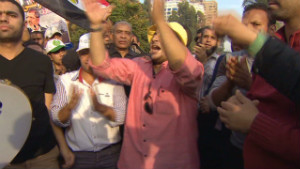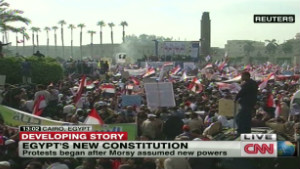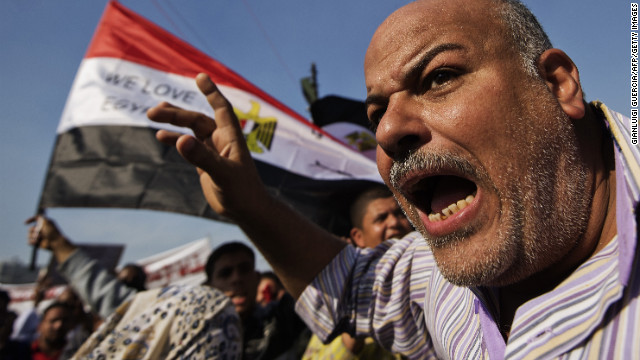Behind Egypt's unrest: In scenes reminiscent of the mass demonstrations that brought about the downfall of forme...http://bit.ly/11rC9Jq

Q & A: What's driving Egypt's unrest?
What's driving Egypt's unrest?
updated 12:18 PM EST, Thu December 6, 2012
STORY HIGHLIGHTS
- Thousands of Egyptians have taken to the streets to protest a presidential edict
- The decree gave the president unchecked power until a new constitution was drafted
- President Morsy has been locked in a power struggle with factions of the old regime
- The hurried completion of a draft for a new constitution may provide a solution
(CNN) -- In scenes reminiscent of the mass demonstrations that brought about the downfall of former Egyptian President Hosni Mubarak in early 2011, thousands of protestors have have taken to the streets in increasingly heated protests over the past two weeks.Five people were killed and 446 injured in clashes between pro- and anti-Morsy demonstrators outside the presidential palace in Cairo, the Egyptian health ministry said Thursday, as tanks rolled into the area in an attempt to disperse protesters.
What's behind the latest unrest?
The protests were sparked by a November 22 presidential decreeissued by President Mohamed Morsy -- the first freely elected leader of this country of 83 million, the most populous Arab nation -- which prevented any court from overturning his decisions until a new, post-Mubarak constitution was ready. The ruling has essentially given him unchecked power, protecting from judicial review any decisions he has made since assuming office.




What was Morsy's rationale?
Insisting the order is temporary -- it will last only until a new constitution was drafted -- Morsy claimed the move was intended to safeguard the revolution. He also gave an assurance his decree would only apply to "sovereign" matters.
In particular, Morsy said, the edict was aimed at preventing interference from the courts in the work of Egypt's Constituent Assembly, the body charged with drafting a new constitution. The judges, many of whom were holdover loyalists from the government of Mubarak, are widely viewed as hostile to the Islamists who now dominate the assembly that has been charged with framing a new constitution. Some had threatened to shut down the assembly.
Morsy's move, which has concentrated power in the hands of the executive, is a continuation of the power struggles between Morsy's Muslim Brotherhood -- the Islamist movement that is Egypt's most powerful political force and won nearly half the seats in parliamentary elections -- and the remnants of the military-dominated establishment of the Mubarak years.
In June, just weeks before Morsy's election, Egypt's military leaders declared parliament invalid and dissolved the body, a ruling which was upheld by Egypt's highest court in September. After his election, Morsy defied the military leadership by calling parliament into session. Morsy's edict ruled out the possibility of repeat interference.
In August, the president moved decisively against the military leadership, sending into retirement Field Marshal Mohammed Hussein Tantawi -- who, as Chairman of the Supreme Council of the Armed Forces, had acted as the country's de facto ruler in the wake of Mubarak's ouster and prior to Morsy's election.
What has been the response to the presidential decree?
Morsy's decree has sharply divided Egyptians. While the Muslim Brotherhood is standing by their man, holding large rallies to show support, many other Egyptians have seen the order as an alarming and undemocratic power grab -- a lurch back towards an authoritarian style of leadership the country had only recently overthrown.
Left-leaning and liberal Egyptians -- who had played a large part in the revolution but were sidelined by the success of Islamists in subsequent elections -- made up a large component of the protestors in Tahrir Square. Many of their chants accused Morsy, the first democratically elected president, of becoming a "new pharaoh" and "dictator."
Many of the original grievances behind the revolution were derived from questions around extreme inequality and corruption. Those issues have not been addressed.
Laleh Khalili, School of Oriental and African Studies
Laleh Khalili, School of Oriental and African Studies
"In some ways, the liberal and left-wing forces are trying to stake a claim to the revolution again through the protests," Laleh Khalili, a reader in politics at the University of London's School of Oriental and African Studies, told CNN.
The demonstrators, who have been calling on Morsy to resign, also included some of those sympathetic to the military and the old regime, she said.
Why has this come about now?
Morsy issued his edict the day after the November 21 cease-fire between Israel and Hamas, which he had played a central role in brokering. Khalili said that, buoyed with new found political capital from his successful foray on the international stage, the Egyptian president may have miscalculated, underestimating the level of outrage his actions would provoke.
The anger on the streets, she said, also reflected a level of public dissatisfaction with progress made since the revolution in addressing issues of poverty and inequality in a country with an unemployment rate of more than 12%, a median age of about 24 years, and a per capita GDP of $6,500.
"Many of the original grievances behind the revolution were derived from questions around extreme inequality and corruption," she said. "Those issues have not been addressed."
The protests represented "a perfect storm of many grievances coming to the fore," she said, and it was not clear how it would play out. "It's a fundamental challenge to the legitimacy of the regime."
What else was in the declaration?
Other aspects of Morsy's edict are likely to prove popular with many of those who have taken to the streets against him. In his decree, Morsy also announced that all deaths and violence connected to the uprising against Mubarak would be investigated again, with those responsible retried if necessary.
This raised the possibility that Mubarak, currently serving a life prison term, could be re-prosecuted, along with a number of regime figures who were previously acquitted.

